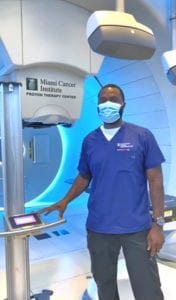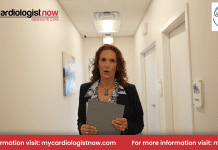|
Getting your Trinity Audio player ready...
|


“I was inspired to give back to others and pursue a job in the healthcare industry after losing my grandmother to colon cancer in 2010. I love my job. I am happy to start early and work late to get the job done. And I have the support of a great team – a family at work. We work as a team to keep the staff, patients and visitors at Miami Cancer Institute safe and healthy. As they say, there is no ‘I’ in team. Although the pandemic has increased awareness of the importance of what we do, we have always maintained the highest standards to keep every surface in the facility clean and sanitized. We suit up in our gear, gloves and masks and utilize ultraviolet (UV) light surface-disinfecting devices throughout the Institute to eliminate germs. We also use the most advanced equipment and products to keep the terrazzo floors clean, polished and beautiful. I’ve been doing this for 14 years – three years at Miami Cancer Institute and 11 years at Baptist Hospital – so I’ve become a master at my craft! And I truly appreciate the recognition for my efforts.”

She developed an exemplary military-like command center and screening system to ensure safety of the vulnerable cancer patient population. Miami Cancer Institute’s best practices in screening patients and employees during the height of the COVID-19 pandemic, may be useful to other hospitals in the next disease outbreak.
Miami Cancer Institute screens 100% of its employees because it serves a high-risk cancer population and must ensure no one is symptomatic. In some periods, they have screened 2,000 people a day with 50 staff members performing the screening process. The effort was accomplished with support from the Baptist Health System, which coordinated the COVID-19 response for its nine hospitals, says Michele Ryder, MSN, MSHSA, RN, CENP, chief operating officer and chief nursing officer of Miami Cancer Institute. The health system and the Miami facility used the recommendations from the Centers for Disease Control and Prevention (CDC) and the more targeted Florida state guidelines to develop a comprehensive testing.

“I was fortunate enough to be trained by incredible physician assistants (PA) early in my career, and I’m very grateful for that guidance during my first year as a cardiology PA. Now, after gaining more experience, I’ve had the opportunity to ‘pay it forward’ and train some of our advanced practice practitioners (APP). I’ve found the process of helping them transition into more confident providers to be very rewarding. During this pandemic, I developed a training document to help the new APPs during their onboarding process. At the suggestion of Dr. Marcus St. John, I also piloted the use of a new risk calculator tool to better evaluate our patients’ pre-procedural risk and improve patient care and outcomes. My goal is to have a positive influence on those around me, and I’m hopeful that the tools I’ve helped implement can improve our confidence as providers and the quality of care we offer our patients.”






